Roberts A.D. The Cambridge History of Africa, Volume 7: from 1905 to 1940
Подождите немного. Документ загружается.

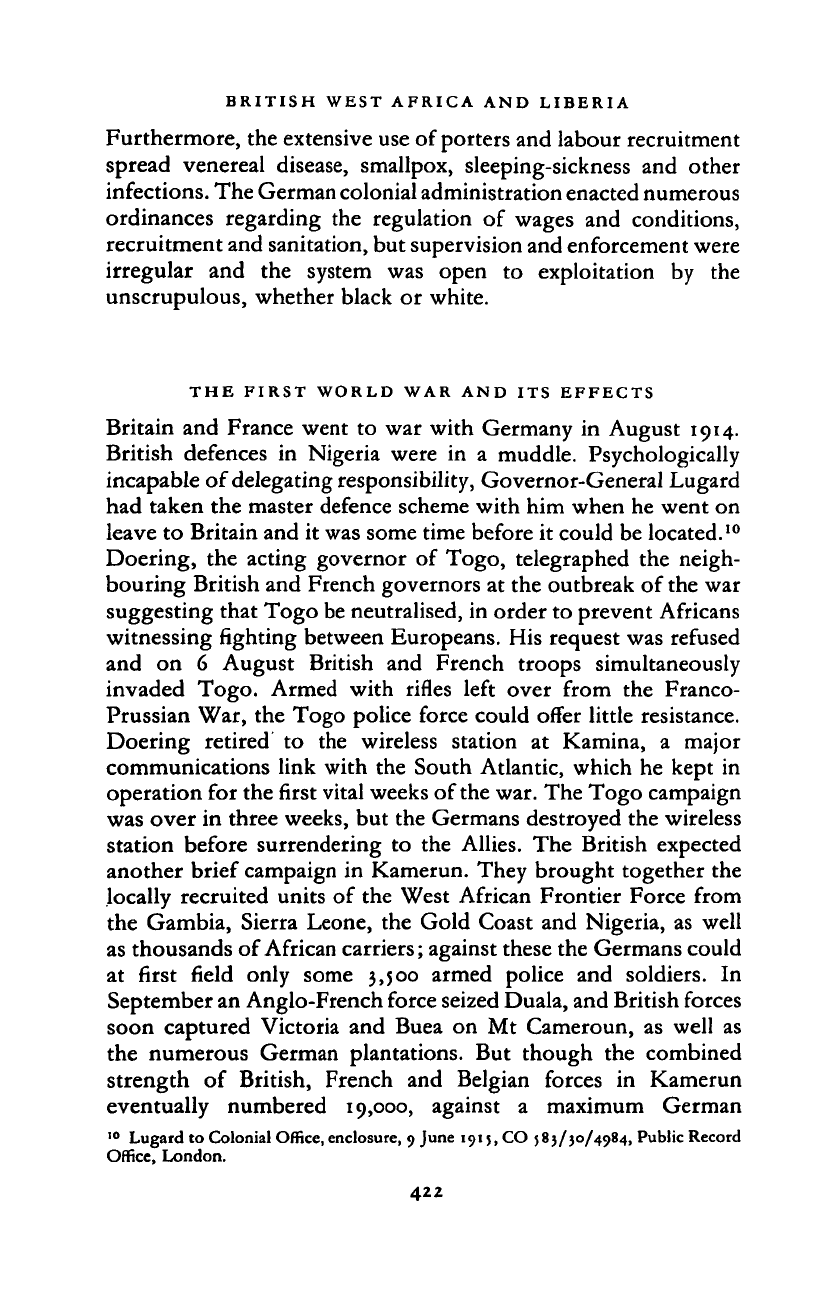
BRITISH WEST AFRICA AND LIBERIA
Furthermore, the extensive use of porters and labour recruitment
spread venereal disease, smallpox, sleeping-sickness
and
other
infections. The German colonial administration enacted numerous
ordinances regarding
the
regulation
of
wages
and
conditions,
recruitment and sanitation, but supervision and enforcement were
irregular
and the
system
was
open
to
exploitation
by the
unscrupulous, whether black
or
white.
THE FIRST WORLD WAR AND ITS EFFECTS
Britain
and
France went
to war
with Germany
in
August 1914.
British defences
in
Nigeria were
in a
muddle. Psychologically
incapable of delegating responsibility, Governor-General Lugard
had taken the master defence scheme with him when he went
on
leave
to
Britain and
it
was some time before
it
could be located.
10
Doering,
the
acting governor
of
Togo, telegraphed
the
neigh-
bouring British and French governors
at
the outbreak
of
the war
suggesting that Togo be neutralised, in order to prevent Africans
witnessing fighting between Europeans. His request was refused
and
on 6
August British
and
French troops simultaneously
invaded Togo. Armed with rifles left over from
the
Franco-
Prussian War,
the
Togo police force could offer little resistance.
Doering retired
to the
wireless station
at
Kamina,
a
major
communications link with
the
South Atlantic, which
he
kept
in
operation
for
the first vital weeks of the war. The Togo campaign
was over
in
three weeks,
but
the Germans destroyed the wireless
station before surrendering
to the
Allies.
The
British expected
another brief campaign
in
Kamerun. They brought together
the
locally recruited units
of
the West African Frontier Force from
the Gambia, Sierra Leone,
the
Gold Coast
and
Nigeria,
as
well
as thousands of African carriers; against these the Germans could
at first field only some 3,500 armed police
and
soldiers.
In
September an Anglo-French force seized Duala, and British forces
soon captured Victoria
and
Buea
on Mt
Cameroun,
as
well
as
the numerous German plantations.
But
though
the
combined
strength
of
British, French
and
Belgian forces
in
Kamerun
eventually numbered 19,000, against
a
maximum German
10
Lugard to Colonial Office, enclosure, 9 June 1915, CO 58)7)0/4984, Public Record
Office, London.
422
Cambridge Histories Online © Cambridge University Press, 2008
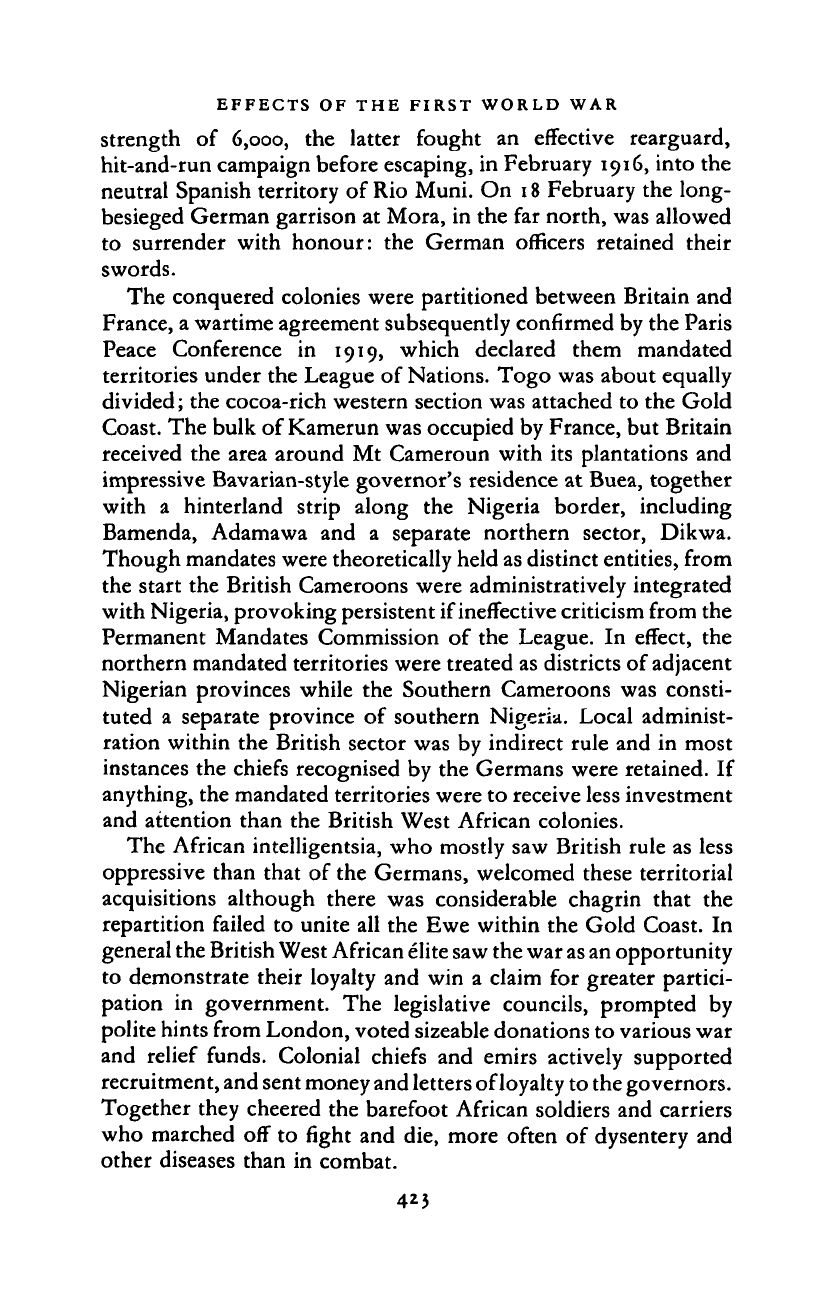
EFFECTS OF THE FIRST WORLD WAR
strength of 6,000, the latter fought an effective rearguard,
hit-and-run campaign before escaping, in February 1916, into the
neutral Spanish territory of Rio Muni. On 18 February the long-
besieged German garrison at Mora, in the far north, was allowed
to surrender with honour: the German officers retained their
swords.
The conquered colonies were partitioned between Britain and
France, a wartime agreement subsequently confirmed by the Paris
Peace Conference in 1919, which declared them mandated
territories under the League of Nations. Togo was about equally
divided; the cocoa-rich western section was attached to the Gold
Coast. The bulk of Kamerun was occupied by France, but Britain
received the area around Mt Cameroun with its plantations and
impressive Bavarian-style governor's residence at Buea, together
with a hinterland strip along the Nigeria border, including
Bamenda, Adamawa and a separate northern sector, Dikwa.
Though mandates were theoretically held as distinct entities, from
the start the British Cameroons were administratively integrated
with Nigeria, provoking persistent if ineffective criticism from the
Permanent Mandates Commission of the League. In effect, the
northern mandated territories were treated as districts of adjacent
Nigerian provinces while the Southern Cameroons was consti-
tuted a separate province of southern Nigeria. Local administ-
ration within the British sector was by indirect rule and in most
instances the chiefs recognised by the Germans were retained. If
anything, the mandated territories were to receive less investment
and attention than the British West African colonies.
The African intelligentsia, who mostly saw British rule as less
oppressive than that of the Germans, welcomed these territorial
acquisitions although there was considerable chagrin that the
repartition failed to unite all the Ewe within the Gold Coast. In
general the British West African elite saw the war
as
an opportunity
to demonstrate their loyalty and win a claim for greater partici-
pation in government. The legislative councils, prompted by
polite hints from London, voted sizeable donations to various war
and relief funds. Colonial chiefs and emirs actively supported
recruitment, and sent money and letters of loyalty to the governors.
Together they cheered the barefoot African soldiers and carriers
who marched off to fight and die, more often of dysentery and
other diseases than in combat.
42 3
Cambridge Histories Online © Cambridge University Press, 2008
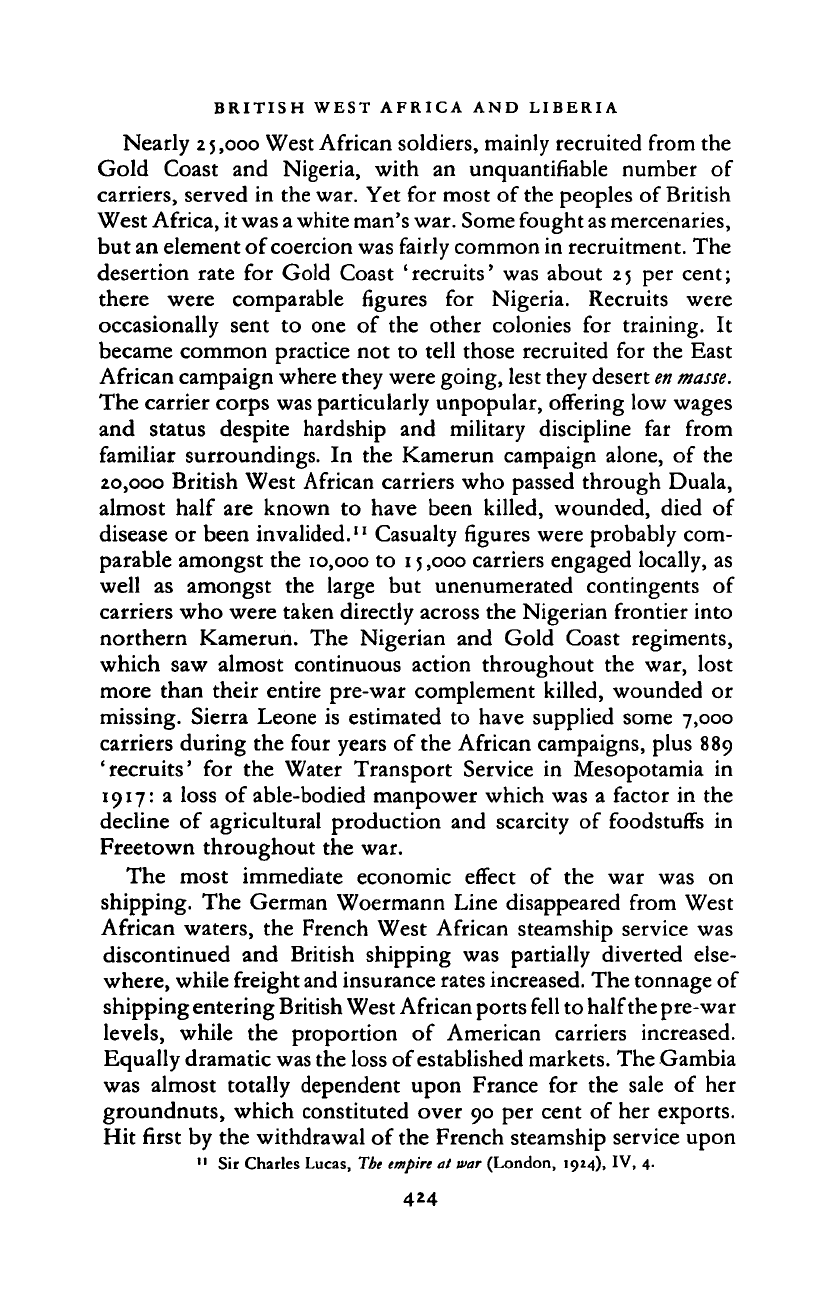
BRITISH WEST AFRICA AND LIBERIA
Nearly 25,000 West African soldiers, mainly recruited from the
Gold Coast
and
Nigeria, with
an
unquantifiable number
of
carriers, served
in
the war. Yet
for
most of the peoples
of
British
West Africa, it was
a
white man's war. Some fought
as
mercenaries,
but an element of coercion was fairly common in recruitment. The
desertion rate
for
Gold Coast 'recruits' was about 25
per
cent;
there were comparable figures
for
Nigeria. Recruits were
occasionally sent
to one of the
other colonies
for
training.
It
became common practice not
to
tell those recruited
for
the East
African campaign where they were going, lest they desert
en
masse.
The carrier corps was particularly unpopular, offering low wages
and status despite hardship
and
military discipline
far
from
familiar surroundings.
In the
Kamerun campaign alone,
of
the
20,000 British West African carriers who passed through Duala,
almost half
are
known
to
have been killed, wounded, died
of
disease
or
been invalided." Casualty figures were probably com-
parable amongst the 10,000
to
15,000 carriers engaged locally,
as
well
as
amongst
the
large
but
unenumerated contingents
of
carriers who were taken directly across the Nigerian frontier into
northern Kamerun.
The
Nigerian
and
Gold Coast regiments,
which
saw
almost continuous action throughout
the
war, lost
more than their entire pre-war complement killed, wounded
or
missing. Sierra Leone
is
estimated
to
have supplied some 7,000
carriers during the four years
of
the African campaigns, plus 889
'recruits'
for the
Water Transport Service
in
Mesopotamia
in
1917:
a
loss
of
able-bodied manpower which was
a
factor
in the
decline
of
agricultural production
and
scarcity
of
foodstuffs
in
Freetown throughout the war.
The most immediate economic effect
of the war was on
shipping. The German Woermann Line disappeared from West
African waters,
the
French West African steamship service was
discontinued
and
British shipping
was
partially diverted else-
where, while freight and insurance rates increased. The tonnage of
shipping entering British West African ports fell to half the pre-war
levels,
while
the
proportion
of
American carriers increased.
Equally dramatic was the loss of established markets. The Gambia
was almost totally dependent upon France
for the
sale
of her
groundnuts, which constituted over
90 per
cent
of
her exports.
Hit first by the withdrawal
of
the French steamship service upon
11
Sir Charles Lucas,
Tbe empire
at
war
(London, 1924), IV,
4.
424
Cambridge Histories Online © Cambridge University Press, 2008
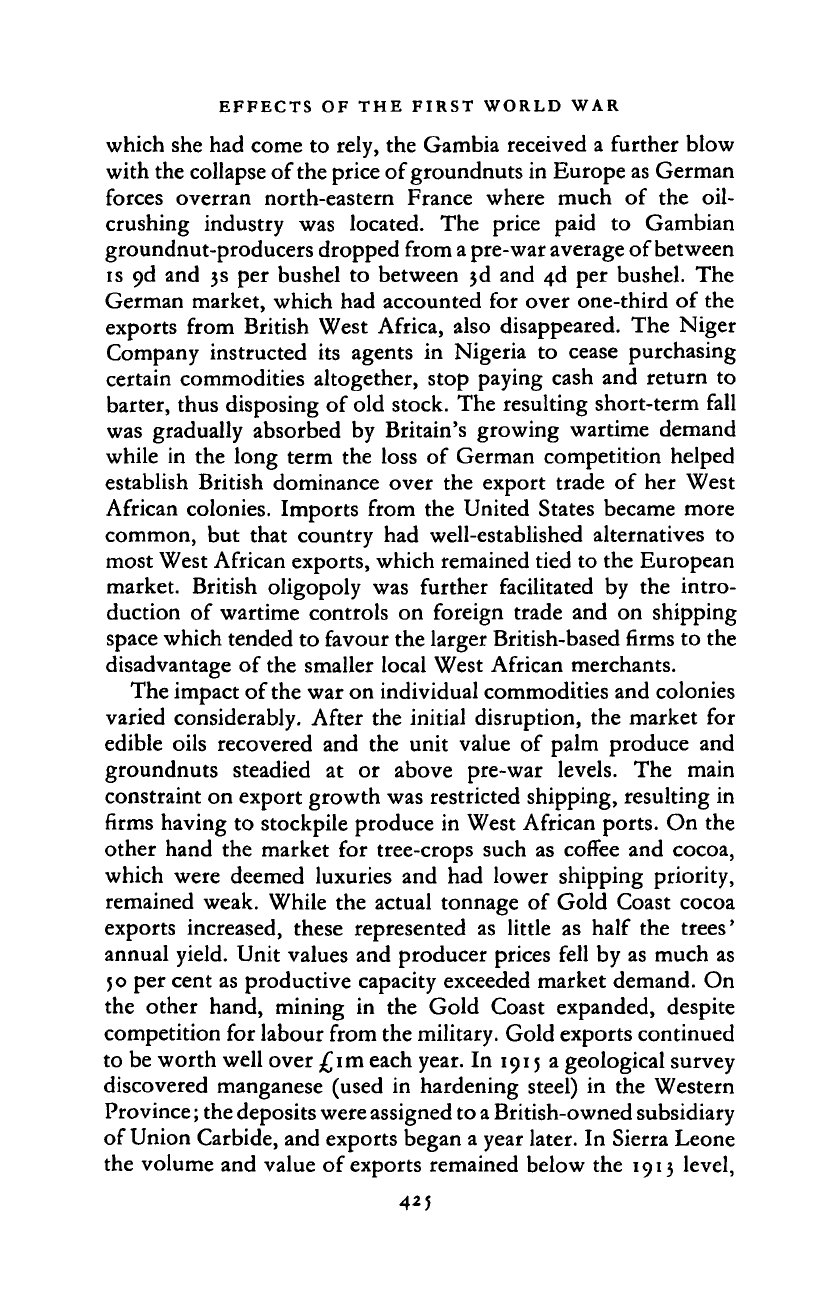
EFFECTS OF THE FIRST WORLD WAR
which she had come to rely, the Gambia received a further blow
with the collapse of the price of groundnuts in Europe as German
forces overran north-eastern France where much of the oil-
crushing industry was located. The price paid to Gambian
groundnut-producers dropped from
a
pre-war average of between
is 9d and 3s per bushel to between 3d and 46 per bushel. The
German market, which had accounted for over one-third of the
exports from British West Africa, also disappeared. The Niger
Company instructed its agents in Nigeria to cease purchasing
certain commodities altogether, stop paying cash and return to
barter, thus disposing of old stock. The resulting short-term fall
was gradually absorbed by Britain's growing wartime demand
while in the long term the loss of German competition helped
establish British dominance over the export trade of her West
African colonies. Imports from the United States became more
common, but that country had well-established alternatives to
most West African exports, which remained tied to the European
market. British oligopoly was further facilitated by the intro-
duction of wartime controls on foreign trade and on shipping
space which tended to favour the larger British-based firms to the
disadvantage of the smaller local West African merchants.
The impact of the war on individual commodities and colonies
varied considerably. After the initial disruption, the market for
edible oils recovered and the unit value of palm produce and
groundnuts steadied at or above pre-war levels. The main
constraint on export growth was restricted shipping, resulting in
firms having to stockpile produce in West African ports. On the
other hand the market for tree-crops such as coffee and cocoa,
which were deemed luxuries and had lower shipping priority,
remained weak. While the actual tonnage of Gold Coast cocoa
exports increased, these represented as little as half the trees'
annual yield. Unit values and producer prices fell by as much as
50 per cent as productive capacity exceeded market demand. On
the other hand, mining in the Gold Coast expanded, despite
competition for labour from the military. Gold exports continued
to be worth well over £itn each year. In 1915 a geological survey
discovered manganese (used in hardening steel) in the Western
Province; the deposits were assigned to
a
British-owned subsidiary
of Union Carbide, and exports began a year later. In Sierra Leone
the volume and value of exports remained below the 1913 level,
425
Cambridge Histories Online © Cambridge University Press, 2008
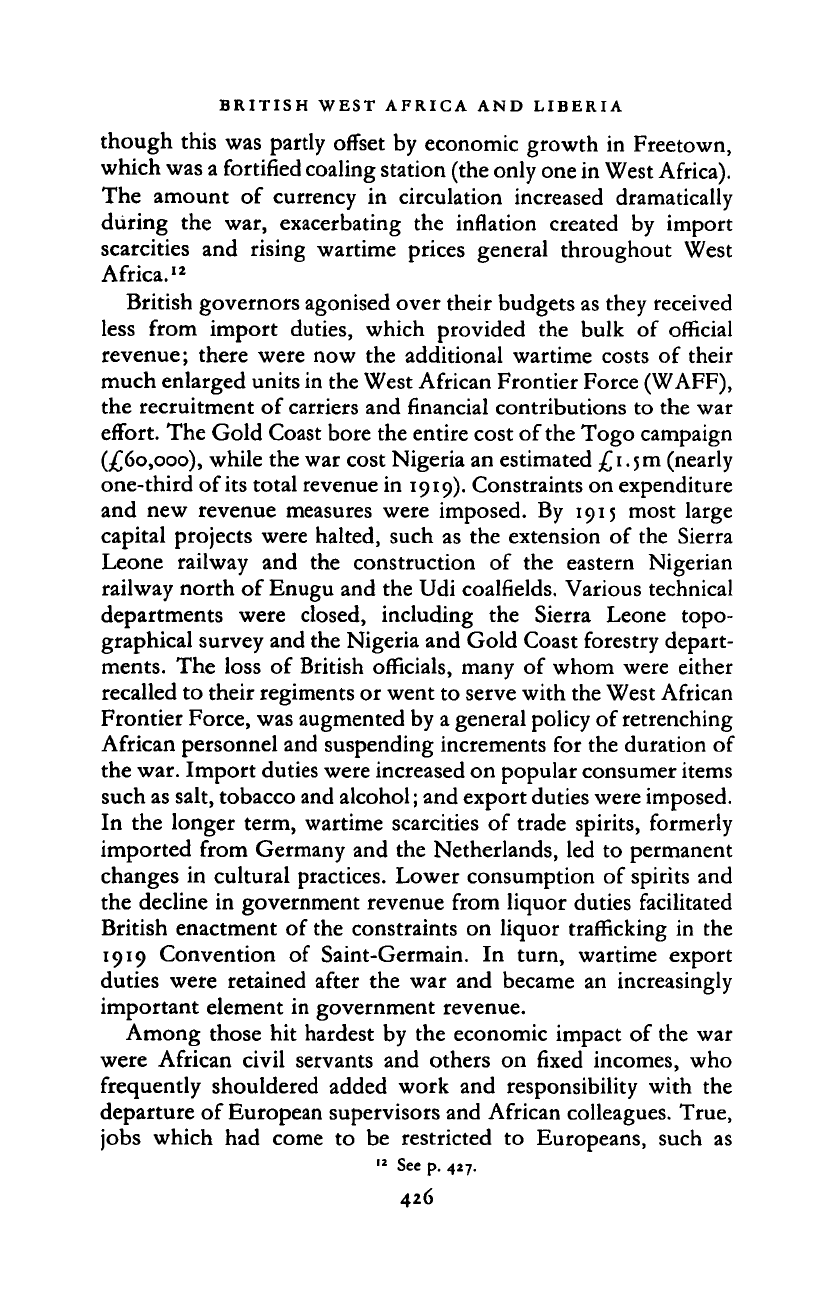
BRITISH WEST AFRICA AND LIBERIA
though this was partly offset by economic growth in Freetown,
which was a fortified coaling station (the only one in West Africa).
The amount of currency in circulation increased dramatically
during the war, exacerbating the inflation created by import
scarcities and rising wartime prices general throughout West
Africa.
12
British governors agonised over their budgets as they received
less from import duties, which provided the bulk of official
revenue; there were now the additional wartime costs of their
much enlarged units in the West African Frontier Force (WAFF),
the recruitment of carriers and financial contributions to the war
effort. The Gold Coast bore the entire cost of the Togo campaign
(£60,000), while the war cost Nigeria an estimated £i,jm (nearly
one-third of its total revenue in 1919). Constraints on expenditure
and new revenue measures were imposed. By 1915 most large
capital projects were halted, such as the extension of the Sierra
Leone railway and the construction of the eastern Nigerian
railway north of Enugu and the Udi coalfields. Various technical
departments were closed, including the Sierra Leone topo-
graphical survey and the Nigeria and Gold Coast forestry depart-
ments. The loss of British officials, many of whom were either
recalled to their regiments or went to serve with the West African
Frontier Force, was augmented by a general policy of retrenching
African personnel and suspending increments for the duration of
the war. Import duties were increased on popular consumer items
such as salt, tobacco and alcohol; and export duties were imposed.
In the longer term, wartime scarcities of trade spirits, formerly
imported from Germany and the Netherlands, led to permanent
changes in cultural practices. Lower consumption of spirits and
the decline in government revenue from liquor duties facilitated
British enactment of the constraints on liquor trafficking in the
1919 Convention of Saint-Germain. In turn, wartime export
duties were retained after the war and became an increasingly
important element in government revenue.
Among those hit hardest by the economic impact of the war
were African civil servants and others on fixed incomes, who
frequently shouldered added work and responsibility with the
departure of European supervisors and African colleagues. True,
jobs which had come to be restricted to Europeans, such as
12
See p. 427.
426
Cambridge Histories Online © Cambridge University Press, 2008
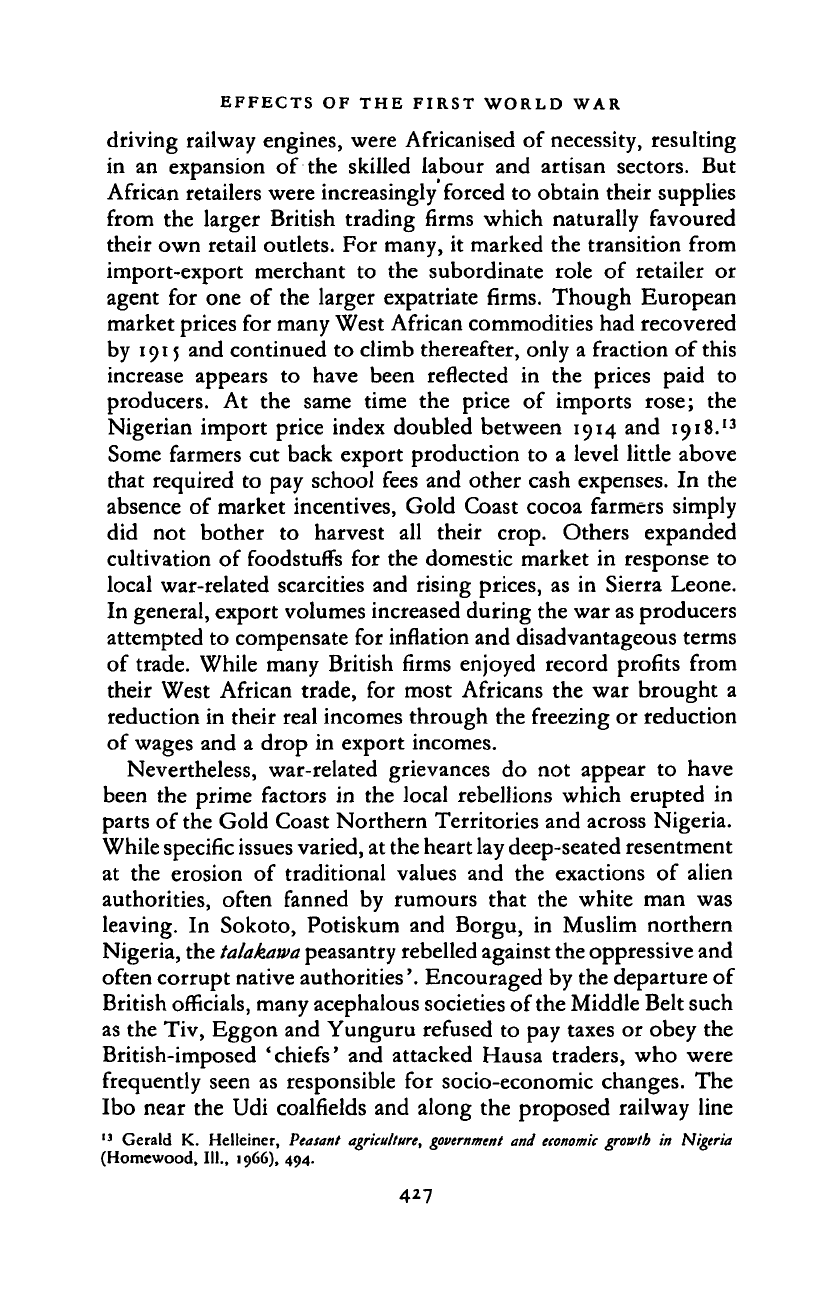
EFFECTS OF THE FIRST WORLD WAR
driving railway engines, were Africanised
of
necessity, resulting
in
an
expansion
of
the
skilled labour
and
artisan sectors.
But
African retailers were increasingly forced
to
obtain their supplies
from
the
larger British trading firms which naturally favoured
their own retail outlets.
For
many,
it
marked
the
transition from
import-export merchant
to the
subordinate role
of
retailer
or
agent
for
one
of
the larger expatriate firms. Though European
market prices
for
many West African commodities had recovered
by 1915 and continued
to
climb thereafter, only
a
fraction
of
this
increase appears
to
have been reflected
in the
prices paid
to
producers.
At the
same time
the
price
of
imports rose;
the
Nigerian import price index doubled between 1914
and
1918.
13
Some farmers
cut
back export production
to a
level little above
that required
to pay
school fees
and
other cash expenses.
In
the
absence
of
market incentives, Gold Coast cocoa farmers simply
did
not
bother
to
harvest
all
their crop. Others expanded
cultivation
of
foodstuffs
for the
domestic market
in
response
to
local war-related scarcities
and
rising prices,
as
in
Sierra Leone.
In general, export volumes increased during the war as producers
attempted
to
compensate
for
inflation and disadvantageous terms
of trade. While many British firms enjoyed record profits from
their West African trade,
for
most Africans
the war
brought
a
reduction
in
their real incomes through the freezing
or
reduction
of wages
and
a
drop
in
export incomes.
Nevertheless, war-related grievances
do not
appear
to
have
been
the
prime factors
in
the
local rebellions which erupted
in
parts
of
the Gold Coast Northern Territories and across Nigeria.
While specific issues varied, at the heart
lay
deep-seated resentment
at
the
erosion
of
traditional values
and
the
exactions
of
alien
authorities, often fanned
by
rumours that
the
white
man was
leaving.
In
Sokoto, Potiskum
and
Borgu,
in
Muslim northern
Nigeria, the
talakawa
peasantry rebelled against the oppressive and
often corrupt native authorities'. Encouraged by the departure of
British officials, many acephalous societies of the Middle Belt such
as the Tiv, Eggon and Yunguru refused
to
pay taxes
or
obey
the
British-imposed 'chiefs'
and
attacked Hausa traders,
who
were
frequently seen
as
responsible
for
socio-economic changes.
The
Ibo near
the Udi
coalfields
and
along
the
proposed railway line
13
Gerald
K.
Helleiner, Peasant agriculture, government
and
economic
growth
in
Nigeria
(Homewood,
111., 1966), 494.
427
Cambridge Histories Online © Cambridge University Press, 2008
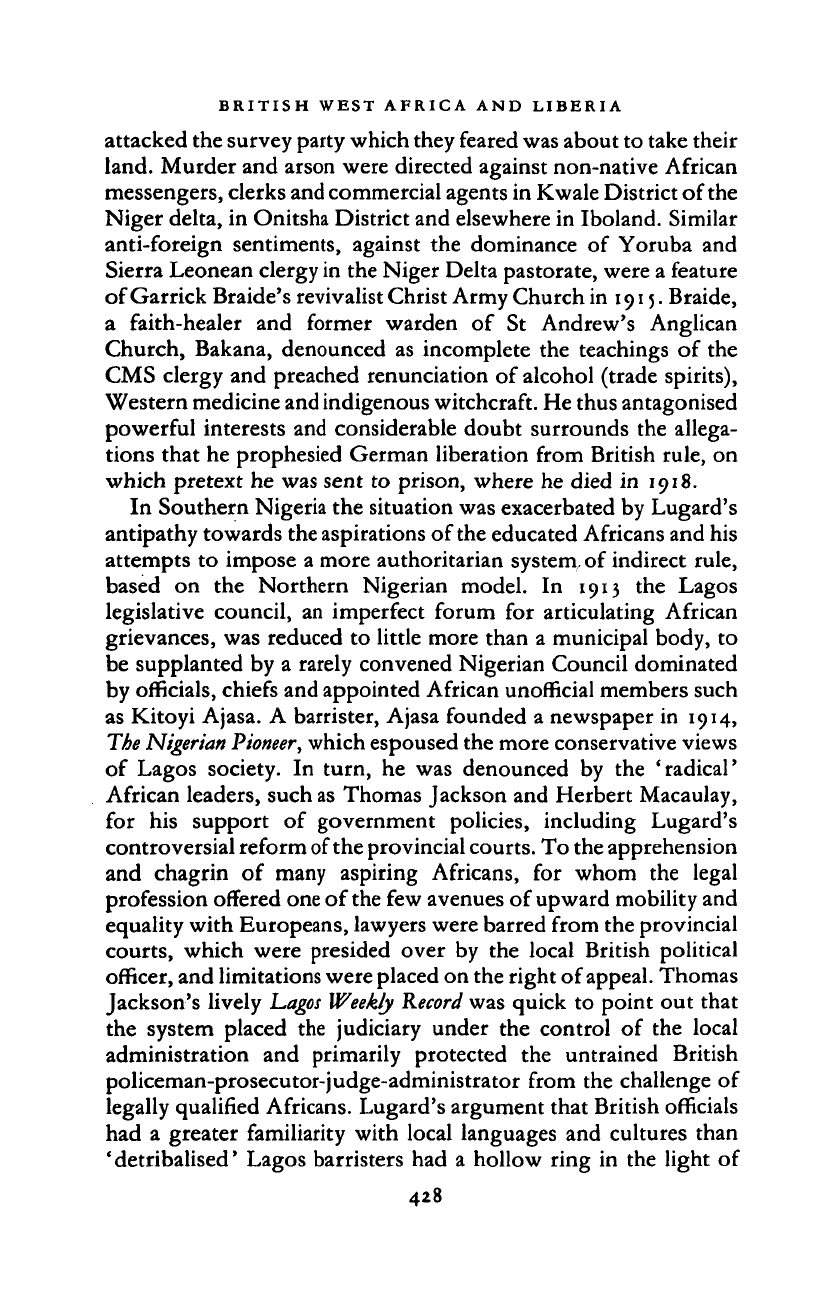
BRITISH WEST AFRICA AND LIBERIA
attacked the survey party which they feared was about to take their
land. Murder and arson were directed against non-native African
messengers, clerks and commercial agents in Kwale District of the
Niger delta, in Onitsha District and elsewhere in Iboland. Similar
anti-foreign sentiments, against the dominance
of
Yoruba and
Sierra Leonean clergy in the Niger Delta pastorate, were a feature
of Garrick Braide's revivalist Christ Army Church in
1915.
Braide,
a faith-healer
and
former warden
of St
Andrew's Anglican
Church, Bakana, denounced as incomplete the teachings
of
the
CMS clergy and preached renunciation of alcohol (trade spirits),
Western medicine and indigenous witchcraft. He thus antagonised
powerful interests and considerable doubt surrounds the allega-
tions that he prophesied German liberation from British rule, on
which pretext he was sent to prison, where he died in 1918.
In Southern Nigeria the situation was exacerbated by Lugard's
antipathy towards the aspirations of the educated Africans and his
attempts to impose a more authoritarian system, of indirect rule,
based
on the
Northern Nigerian model.
In
1913
the
Lagos
legislative council, an imperfect forum for articulating African
grievances, was reduced to little more than a municipal body,
to
be supplanted by a rarely convened Nigerian Council dominated
by officials, chiefs and appointed African unofficial members such
as Kitoyi Ajasa. A barrister, Ajasa founded a newspaper in 1914,
The Nigerian
Pioneer,
which espoused the more conservative views
of Lagos society.
In
turn,
he
was denounced
by
the 'radical'
African leaders, such as Thomas Jackson and Herbert Macaulay,
for
his
support
of
government policies, including Lugard's
controversial reform of the provincial
courts.
To the apprehension
and chagrin
of
many aspiring Africans,
for
whom
the
legal
profession offered one of the few avenues of upward mobility and
equality with Europeans, lawyers were barred from the provincial
courts, which were presided over by the local British political
officer, and limitations were placed on the right of appeal. Thomas
Jackson's lively
Lagos
Weekly
Record
was quick to point out that
the system placed the judiciary under the control
of
the local
administration
and
primarily protected
the
untrained British
policeman-prosecutor-judge-administrator from the challenge of
legally qualified Africans. Lugard's argument that British officials
had
a
greater familiarity with local languages and cultures than
'detribalised' Lagos barristers had
a
hollow ring in the light of
428
Cambridge Histories Online © Cambridge University Press, 2008
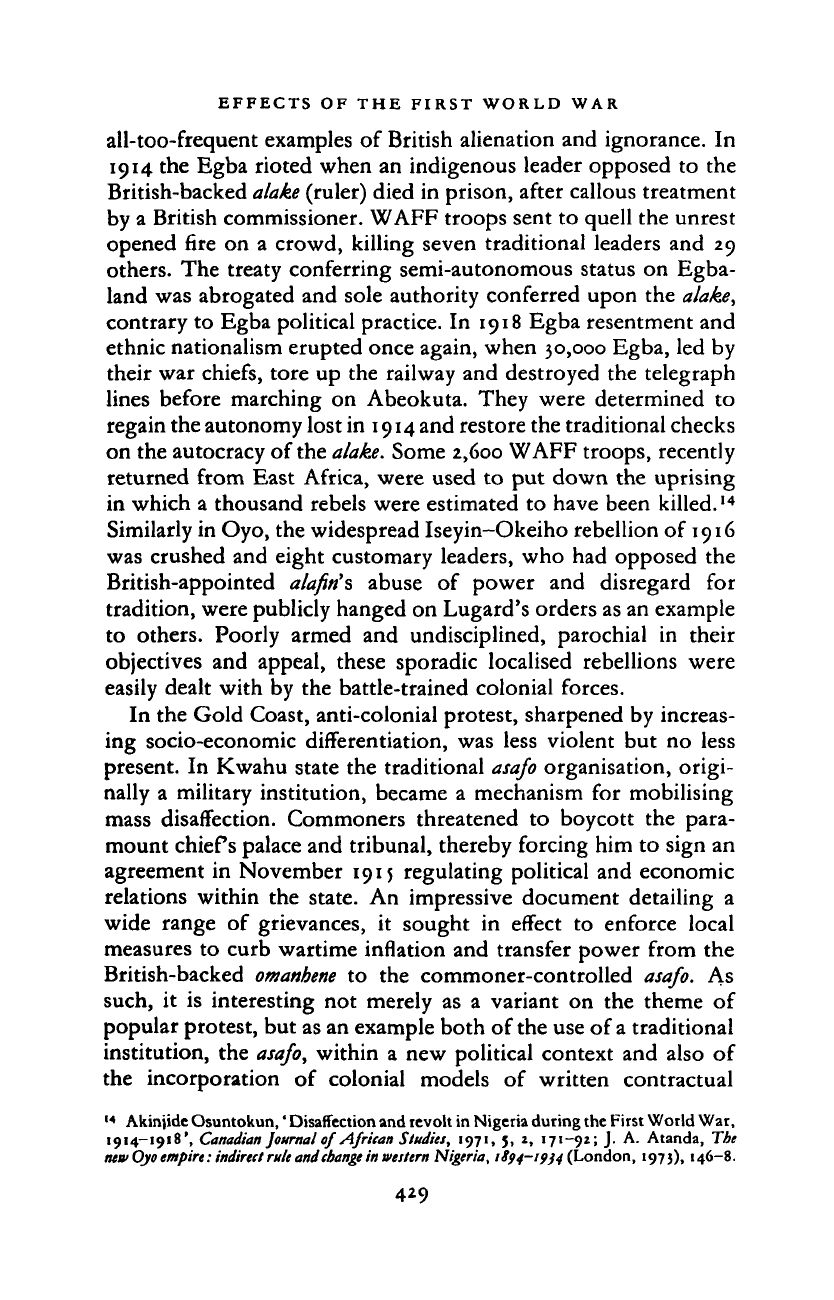
EFFECTS OF THE FIRST WORLD WAR
all-too-frequent examples
of
British alienation and ignorance.
In
1914 the Egba rioted when an indigenous leader opposed
to
the
British-backed
alake
(ruler) died in prison, after callous treatment
by a British commissioner. WAFF troops sent to quell the unrest
opened fire
on a
crowd, killing seven traditional leaders and
29
others. The treaty conferring semi-autonomous status
on
Egba-
land was abrogated and sole authority conferred upon the alake,
contrary to Egba political practice.
In
1918 Egba resentment and
ethnic nationalism erupted once again, when 30,000 Egba, led by
their war chiefs, tore up the railway and destroyed the telegraph
lines before marching
on
Abeokuta. They were determined
to
regain the autonomy lost in
1914
and restore the traditional checks
on the autocracy of the
alake.
Some 2,600 WAFF troops, recently
returned from East Africa, were used
to
put down the uprising
in which
a
thousand rebels were estimated
to
have been killed.
14
Similarly in Oyo, the widespread Iseyin-Okeiho rebellion
of
1916
was crushed and eight customary leaders, who had opposed
the
British-appointed alafin's abuse
of
power
and
disregard
for
tradition, were publicly hanged on Lugard's orders as an example
to others. Poorly armed
and
undisciplined, parochial
in
their
objectives
and
appeal, these sporadic localised rebellions were
easily dealt with by the battle-trained colonial forces.
In the Gold Coast, anti-colonial protest, sharpened by increas-
ing socio-economic differentiation, was less violent
but no
less
present.
In
Kwahu state the traditional
asafo
organisation, origi-
nally
a
military institution, became
a
mechanism
for
mobilising
mass disaffection. Commoners threatened
to
boycott
the
para-
mount chiefs palace and tribunal, thereby forcing him to sign an
agreement
in
November 1915 regulating political and economic
relations within
the
state.
An
impressive document detailing
a
wide range
of
grievances,
it
sought
in
effect
to
enforce local
measures
to
curb wartime inflation and transfer power from the
British-backed
omanhene
to the
commoner-controlled asafo.
As
such,
it is
interesting
not
merely
as a
variant
on the
theme
of
popular protest, but as an example both of the use of
a
traditional
institution, the
asafo,
within
a
new political context and also
of
the incorporation
of
colonial models
of
written contractual
14
Akinjide Osuntokun,' Disaffection and revolt in Nigeria during the First World War,
1914-1918',
Canadian Journal
of African
Studies,
1971, 5,
2,
171-92;
J. A.
Atanda, The
new Oyo
empire:
indirect rule
and
change
in
western
Nigeria, 1X94-19)4 (London, 1973), 146-8.
429
Cambridge Histories Online © Cambridge University Press, 2008
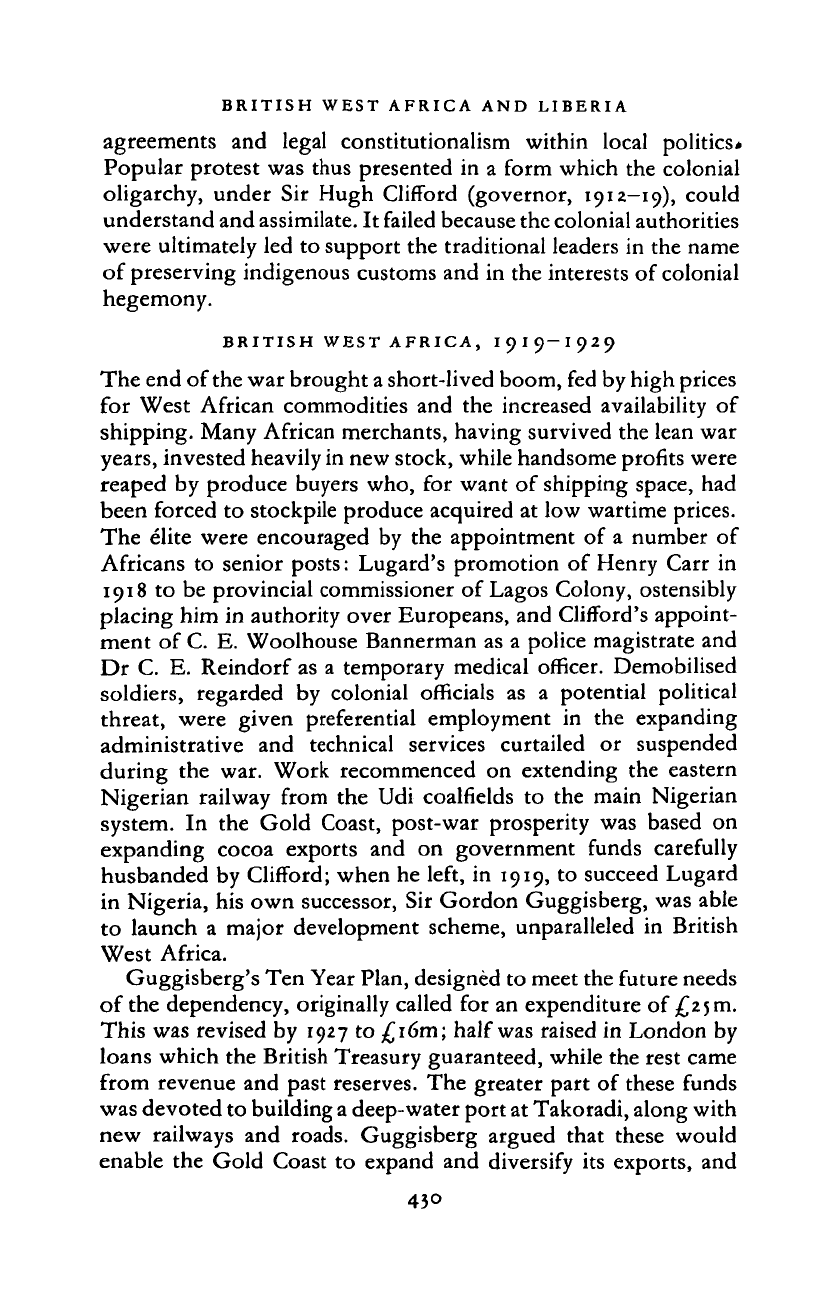
BRITISH WEST AFRICA AND LIBERIA
agreements
and
legal constitutionalism within local politics*
Popular protest was thus presented in a form which the colonial
oligarchy, under Sir Hugh Clifford (governor, 1912-19), could
understand and assimilate. It failed because the colonial authorities
were ultimately led to support the traditional leaders in the name
of preserving indigenous customs and in the interests of colonial
hegemony.
BRITISH WEST AFRICA, 1919—1929
The end of the war brought
a
short-lived boom, fed by high prices
for West African commodities and the increased availability of
shipping. Many African merchants, having survived the lean war
years,
invested heavily in new stock, while handsome profits were
reaped by produce buyers who, for want of shipping space, had
been forced to stockpile produce acquired at low wartime prices.
The elite were encouraged by the appointment of a number of
Africans
to
senior posts: Lugard's promotion of Henry Carr in
1918 to be provincial commissioner of Lagos Colony, ostensibly
placing him in authority over Europeans, and Clifford's appoint-
ment of C. E. Woolhouse Bannerman as a police magistrate and
Dr C.
E.
Reindorf as a temporary medical officer. Demobilised
soldiers, regarded
by
colonial officials
as a
potential political
threat, were given preferential employment
in
the expanding
administrative
and
technical services curtailed
or
suspended
during the war. Work recommenced on extending the eastern
Nigerian railway from the Udi coalfields
to
the main Nigerian
system.
In
the Gold Coast, post-war prosperity was based
on
expanding cocoa exports and
on
government funds carefully
husbanded by Clifford; when he left, in 1919, to succeed Lugard
in Nigeria, his own successor, Sir Gordon Guggisberg, was able
to launch
a
major development scheme, unparalleled
in
British
West Africa.
Guggisberg's Ten Year Plan, designed to meet the future needs
of the dependency, originally called for an expenditure of £z
5
m.
This was revised by 1927 to £i6m; half was raised in London by
loans which the British Treasury guaranteed, while the rest came
from revenue and past reserves. The greater part of these funds
was devoted to building
a
deep-water port at Takoradi, along with
new railways and roads. Guggisberg argued that these would
enable the Gold Coast to expand and diversify its exports, and
430
Cambridge Histories Online © Cambridge University Press, 2008
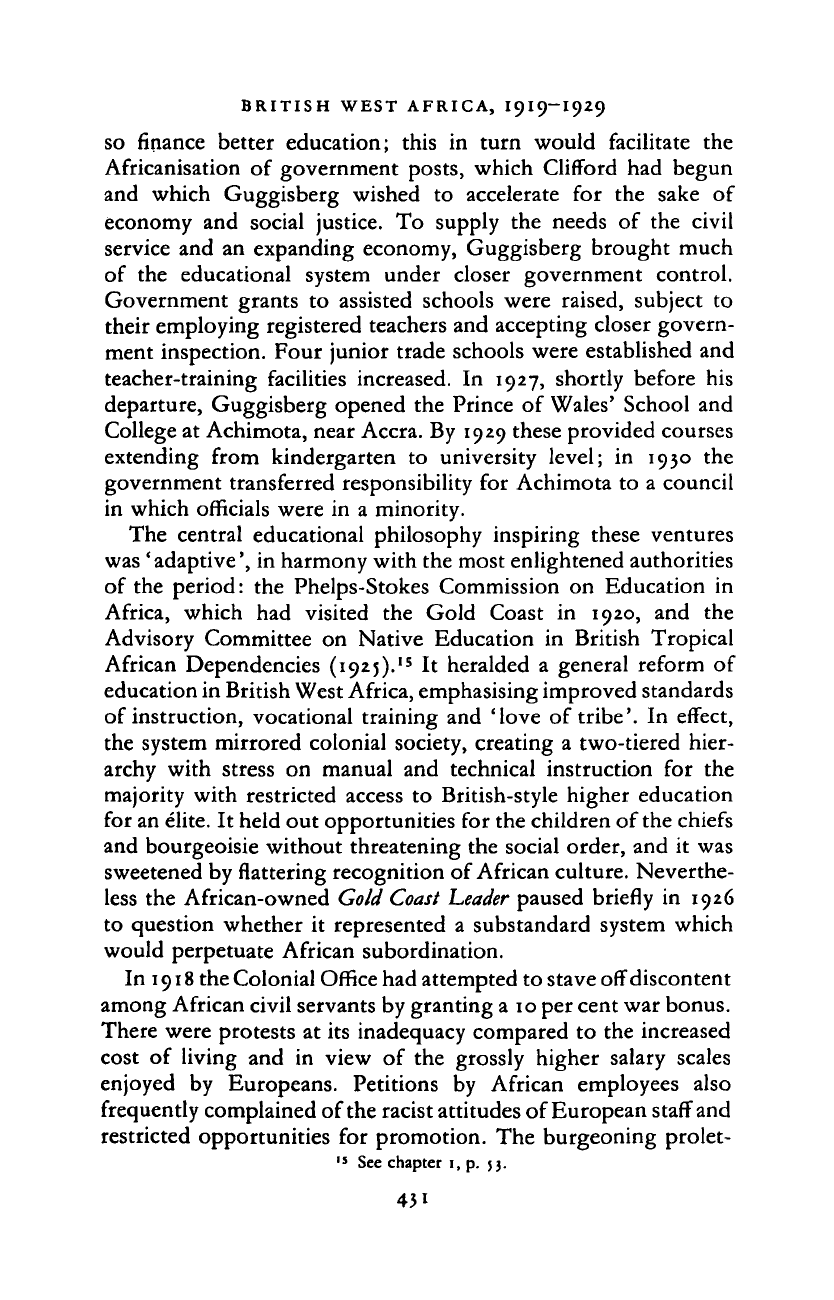
BRITISH WEST AFRICA, 1919-1929
so finance better education; this in turn would facilitate the
Africanisation of government posts, which Clifford had begun
and which Guggisberg wished to accelerate for the sake of
economy and social justice. To supply the needs of the civil
service and an expanding economy, Guggisberg brought much
of the educational system under closer government control.
Government grants to assisted schools were raised, subject to
their employing registered teachers and accepting closer govern-
ment inspection. Four junior trade schools were established and
teacher-training facilities increased. In 1927, shortly before his
departure, Guggisberg opened the Prince of Wales' School and
College at Achimota, near Accra. By 1929 these provided courses
extending from kindergarten to university level; in 1930 the
government transferred responsibility for Achimota to a council
in which officials were in a minority.
The central educational philosophy inspiring these ventures
was 'adaptive', in harmony with the most enlightened authorities
of the period: the Phelps-Stokes Commission on Education in
Africa, which had visited the Gold Coast in 1920, and the
Advisory Committee on Native Education in British Tropical
African Dependencies (1925).
15
It heralded a general reform of
education in British West Africa, emphasising improved standards
of instruction, vocational training and 'love of tribe'. In effect,
the system mirrored colonial society, creating a two-tiered hier-
archy with stress on manual and technical instruction for the
majority with restricted access to British-style higher education
for an elite. It held out opportunities for the children of the chiefs
and bourgeoisie without threatening the social order, and it was
sweetened by flattering recognition of African culture. Neverthe-
less the African-owned Gold
Coast Leader
paused briefly in 1926
to question whether it represented a substandard system which
would perpetuate African subordination.
In 1918 the Colonial Office had attempted to stave off discontent
among African civil servants by granting a
10
per cent war bonus.
There were protests at its inadequacy compared to the increased
cost of living and in view of the grossly higher salary scales
enjoyed by Europeans. Petitions by African employees also
frequently complained of the racist attitudes of European staff and
restricted opportunities for promotion. The burgeoning prolet-
15
See chapter
i,
p.
53.
43*
Cambridge Histories Online © Cambridge University Press, 2008
